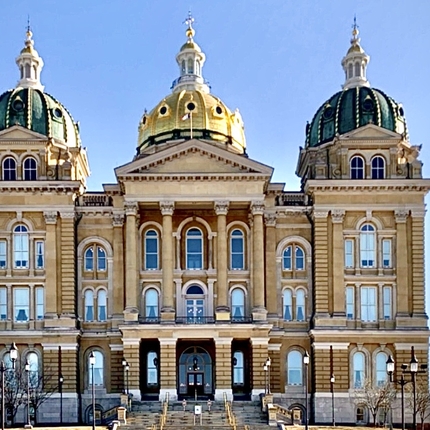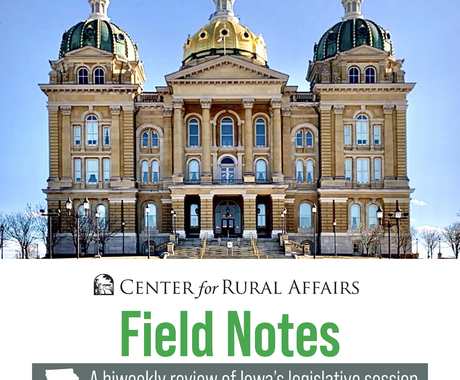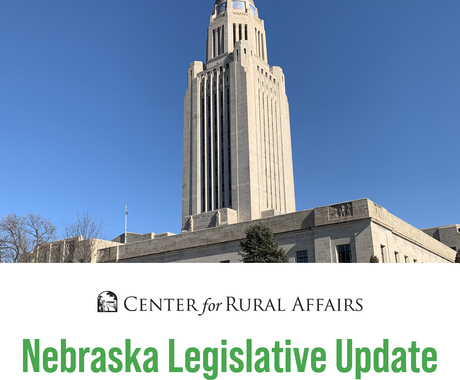By Cody Smith, former staff member
We are now entering the fifth full week of the 2020 legislative session. As legislators, agencies, the governor’s office, and committees have worked to introduce and review legislation, we’ve been engaging with them to make sure rural Iowans have a seat at the table. In all, we have registered for, against, or undecided on 19 bills which relate to water quality, renewable energy, economic development, and more.
As bills are introduced in the next few weeks, we will keep you informed on our lead initiatives and other key legislation we are following.
Water quality
Funding for Iowa’s Water and Land Legacy (IWILL)
Senate Study Bill (SSB) 3116 (For): A bill for an act relating to state and local revenue and finances, including modifying individual income taxes, sales and use taxes, water service tax, and certain tax credits and provisions relating to county juvenile court expenses and mental health region funding, making appropriations, and including effective date and applicability provisions.
During her Condition of the State Address on Jan. 14, Gov. Kim Reynolds announced her plan for a one-cent sales tax increase as part of her Invest in Iowa proposal to the Legislature. This one-cent increase includes the necessary three-eights of one cent increase to fund the Natural Resources & Outdoor Recreation Trust, or IWILL. Click here to review our analysis. For the first time since her announcement, we have bill language to review. Last week, SSB 3116 was assigned to the Senate Ways and Means Committee.
As noted in previous updates, we have been advocating for the investment of IWILL dollars in Watershed Management Authorities (WMAs). We worked alongside staff in the governor’s office to develop a program that would make funding available to WMAs to help cover the expenses of employing a watershed coordinator at the local level. This change appears in SSB 3116 as the newly-created Local Conservation Partnerships Program. For the first time, this program will include WMAs as an eligible entity to receive funds from the Local Conservation Partnerships Account in IWILL. In the coming weeks, we will continue to advocate for increases in funding to this account. You can expect more information from us on this bill in the coming weeks, but I encourage you to reach out sooner if there are questions you have.
Senate File (SF) 2047 (For): An Act relating to the property tax exemption for property designated to be a native prairie or wetland and including effective date and retroactive applicability provisions.
Current Code section 427.1(23) provides a property tax exemption for land designated as native prairie or land designated as a protected wetland by the Department of Natural Resources if the property is not used for economic gain. This bill specifies that the receipt of payments under the federal wetlands reserve program or the federal agricultural conservation easement program shall not be considered a use for economic gain.
Update: On Jan. 27 this bill was assigned to a subcommittee consisting of Sens. Brown, Behn, and Giddens.
SF 2188 (For): An Act concerning federal financial assistance funding for hazard mitigation. (Successor to SSB 3057)
This bill would allow the state to help provide funds to supplement federal hazard mitigation dollars. Up to 10 percent would be eligible if granted under the federal Robert T. Stafford Disaster Relief and Emergency Assistance Act or the federal National Flood Insurance Reform Act of 1994. Under this bill, the state cannot exceed 50 percent of the total project cost. The local community must have a state-approved comprehensive emergency plan. We are also registered in support of this bill’s companion in the House, House Study Bill (HSB) 625.
Update: This bill, formerly SSB 3057, was approved by the Senate Committee on State Government and renumbered as SF 2188.
House Study Bill (HSB) 619 (For): An Act relating to the establishment of a disaster recovery homeowner assistance program and fund administered by the Iowa finance authority, transfers of moneys to certain funds,and including effective date provisions.
Under the newly created program, this bill codifies that eligible expenses would include repair or rehabilitation of the disaster-affected home, or for down payment assistance on the purchase of replacement housing outside of a 100-year floodplain, and the cost of reasonable repairs to be performed on the replacement housing to render it decent, safe, sanitary, and in good repair.
Update: This bill has been scheduled for a subcommittee meeting on Feb. 12 at 11:15 a.m. in the House Lounge with Reps. Jacobsen, Bossman and Nielsen.
House File (HF) 2111 (Undecided): An Act providing for the powers of commissioners of soil and water conservation districts.
This bill amends provisions authorizing commissioners to exercise a number of powers, subject to certain limitations, including to conduct surveys, investigations, research activities, and demonstration projects. The bill provides that commissioners must also act to conserve or enhance soil health and water resources, and reduce the effects of flooding. This bill also makes changes into required partnerships Soil and Water Conservation Districts must make with Iowa State University.
Clean energy
HF 476 (For): An Act relating to solar energy system tax credits, and including applicability provisions.
This bill increases the maximum cumulative value of solar energy system tax credits eligible to be claimed annually by applicants from $5 million to $10 million. We will continue to work with our partners to advance this bill and expand the credit even further, while also pushing for language decoupling this state-level solar production tax credit from the federal tax credit, which began a gradual phase out in 2020.
HF 669 (Against): An Act relating to electric utility rates and infrastructure support options for private generation customers.
This bill would add a large annual fee to consumer-generators who own their own solar panels, disincentivizing net metering. Net metering allows farmers to “store” the excess energy they produce on the grid, which helps reduce electricity costs during peak demand hours for their neighbors and provides a cost-cutting strategy for farmers. We are also registered in opposition to SF 583, which is this bill’s predecessor in the Senate.
Update: After we helped defeat the misguided “sunshine tax” last year, we have been part of a coalition of solar advocates who have worked with MidAmerican Energy over the past eight months to find a compromise on solar legislation. A deal has been reached that will help provide consistency, reliability and the opportunity for solar energy to continue to grow in Iowa. The deal is subject to final agreement on amendment language and earning legislative support. Legislation is being drafted as a strike and replace amendment to the bill that was introduced last year. When adopted, the amendment then becomes the bill.
HSB 540 (For): An Act relating to the construction, ownership, and maintenance of electric transmission lines.
This bill helps advance the development of transmission lines and grid infrastructure by granting “right of first refusal” to developers who lead the planning process of energy infrastructure projects. Transmission infrastructure development is crucial for expanding renewable energy development.
Update: This bill was assigned to a subcommittee consisting of Reps. Carlson, Deyoe and Nielsen.
HF 2124 (Undecided): An Act authorizing cities and counties to establish energy investment districts and district boards and providing for financing of energy investments.
This bill authorizes a county or city, or one or more counties and one or more cities within those counties to create an energy investment district to finance energy investment projects for the benefit of property within the district. The bill defines an “energy investment” as an acquisition, installation, or modification benefitting private property, except residential property with fewer than three residential units, intended to reduce energy consumption or energy costs, or both, or to allow for the use of alternate and renewable energy.
Update: Referred to the House Commerce Committee.
HF 2168 (Undecided): An Act relating to the assessment of wind energy conversion property for certain assessment years and including applicability provisions.
Under current law, cities or county boards of supervisors may adopt a local valuation on wind energy systems. These valuations are set as percentages of the net acquisition cost. This bill increases the percentage of net acquisition cost at which wind energy conversion property is assessed for the seventh and succeeding assessment years from 30 percent to 50 percent. Learn more about this process here.
SSB 3128 (Undecided): An Act relating to the regulation of renewable energy projects and including applicability provisions.
This bill prohibits counties, after July 1, 2020, from adopting or enforcing an ordinance, motion, resolution, or amendment that imposes a limitation or regulation on a renewable energy project, as defined in Code section 476A.1, having a total capacity of at least 25 megawatts of electricity. In sum, it restricts counties from establishing their own regulations for wind and solar projects.
Economic development
HF 2023 (For): An Act exempting from the computation of the individual and corporate state income taxes broadband grants received by communications service providers, and including effective date and retroactive applicability provisions.
This bill allows a communications service provider who receives a federal, state, or local broadband grant to exclude the total of that grant from the computation of their individual or corporate state income tax if the grant is used to install broadband infrastructure in targeted areas where no provider offers internet service that meets broadband speed thresholds. Broadband speeds are defined as 25 Megabits per second (Mbps) for download and 3 Mbps upload by the Federal Communications Commission.
Update: This bill was passed by subcommittee and is currently in the House Ways and Means Committee.
SF 2048 (For): An Act relating to the connecting Iowa farms, schools, and communities broadband grant program, making appropriations, and including effective date provisions.
Under current state law, the Office of the Chief Information Officer, which administers the Connecting Iowa Farms, Schools, and Communities Broadband Grant Program, is prohibited from awarding a grant if it exceeds more than 15 percent of the communications service provider’s total project cost. This bill would increase the cap to 25 percent, thus allowing for more state investment in broadband infrastructure.
Update: This bill was assigned to a subcommittee of Sens. Kraayenbrink, Celsi, and Johnson.
SF 601 (Undecided): An Act establishing a pesticide administration and enforcement fund and making appropriations.
This legislation would create a Pesticide Administration and Enforcement Fund under Section 206.5A of the Pesticide Act of Iowa for the sole purpose of administering certification courses and enforcing the rules of the act. This fund would collect the $75 fee for a three year commercial pesticide applicator certification and the $15 fee for a three year private/personal pesticide applicators license.
HSB 632 (Undecided): An Act relating to county zoning procedures, and including effective date and applicability provisions.
This bill prohibits a county from requiring an application, approval, or payment of a fee for the exemption to apply to land, farm barns, farm outbuildings, or other buildings or structures that are primarily adopted for use for agricultural purposes. Under the bill, agricultural land, buildings, and structures can qualify for the exemption independently or in combination with other agricultural uses. The bill also specifies that land enrolled in a soil or water conservation program qualifies for the agricultural exemption.
Update: This bill will be heard in a subcommittee of Reps. Kaufmann, Sexton, Deyoe, Hunter and Mascher 9:30 a.m., Feb. 11, in the House Lounge. The companion bill in the Senate, SSB 3120 was assigned to a subcommittee of Sens. Edler, Hogg, and Kraayenbrink.
Upcoming events
Feb. 21: First Funnel deadline. This is the final day for Senate legislation to exit Senate committees and House legislation to exit House committees.
March 11: Environmental Lobby Day at the Capitol Building.
Important links
Find your lawmakers' contact information
View the Iowa Legislative Calendar
Support and learn about the Center for Rural Affairs
Related content
2020 Iowa Legislative Priorities
Fact Sheet: Soil Health in Iowa
Iowa Watershed Resource Library
Fact Sheet: Watershed Management Authorities in Iowa
Fact Sheet: Watershed Planning 101
Fact Sheet: Leveraging Local Funds for Watershed Improvement




